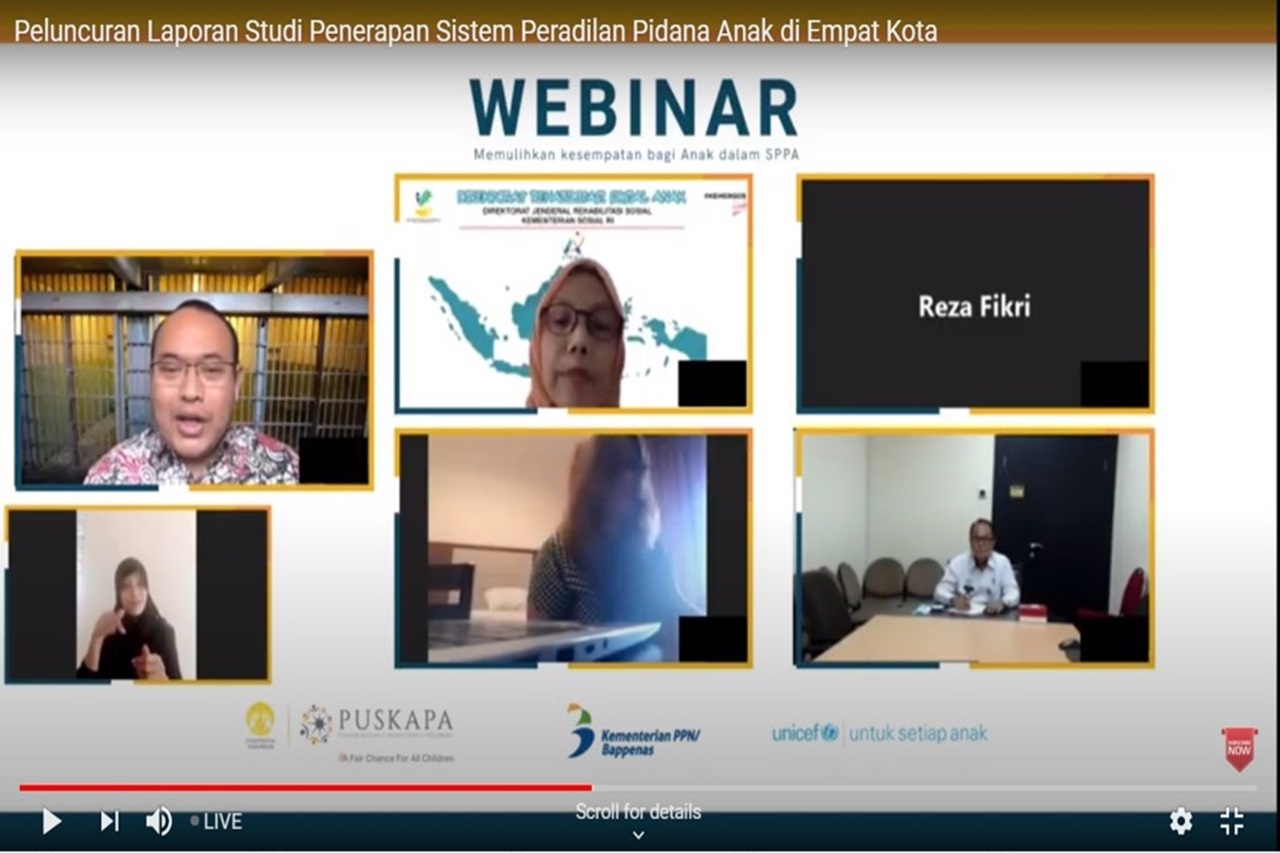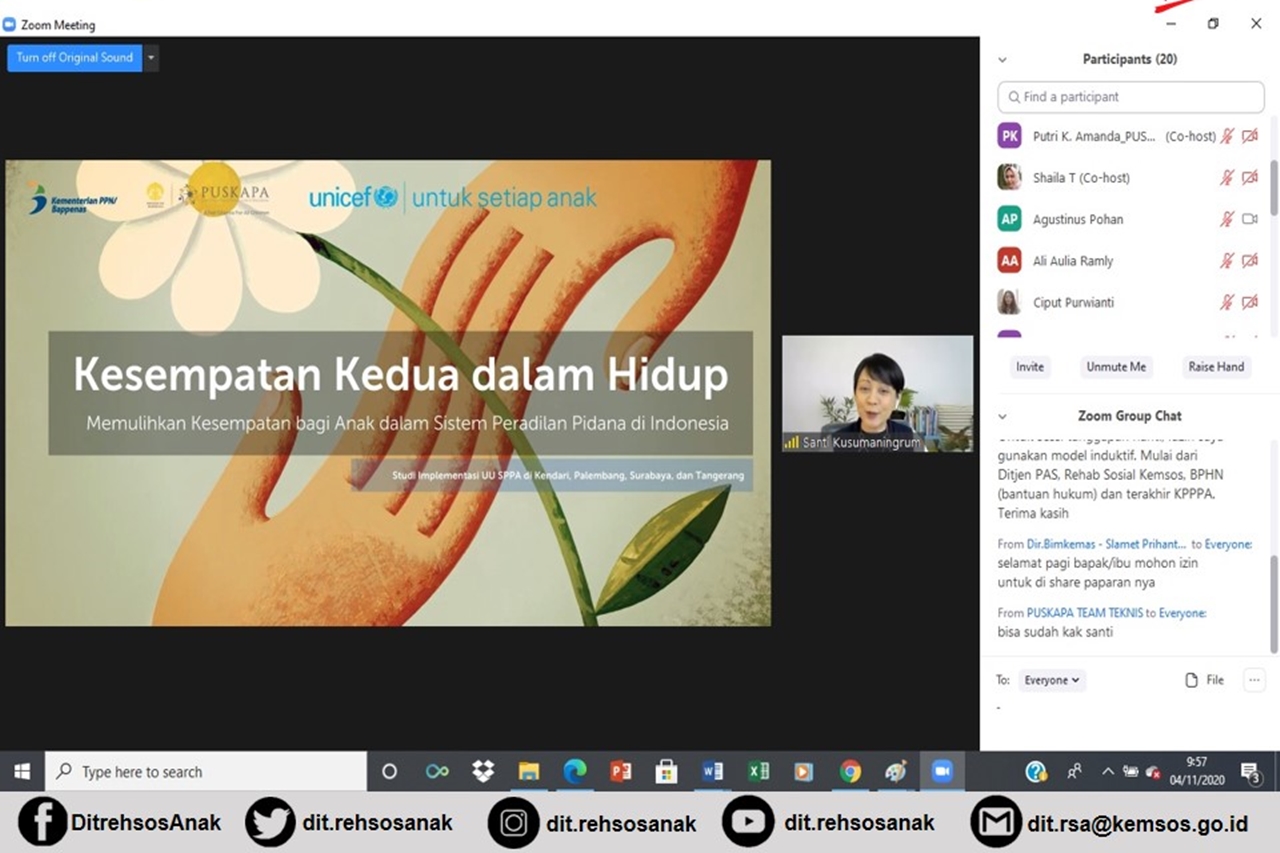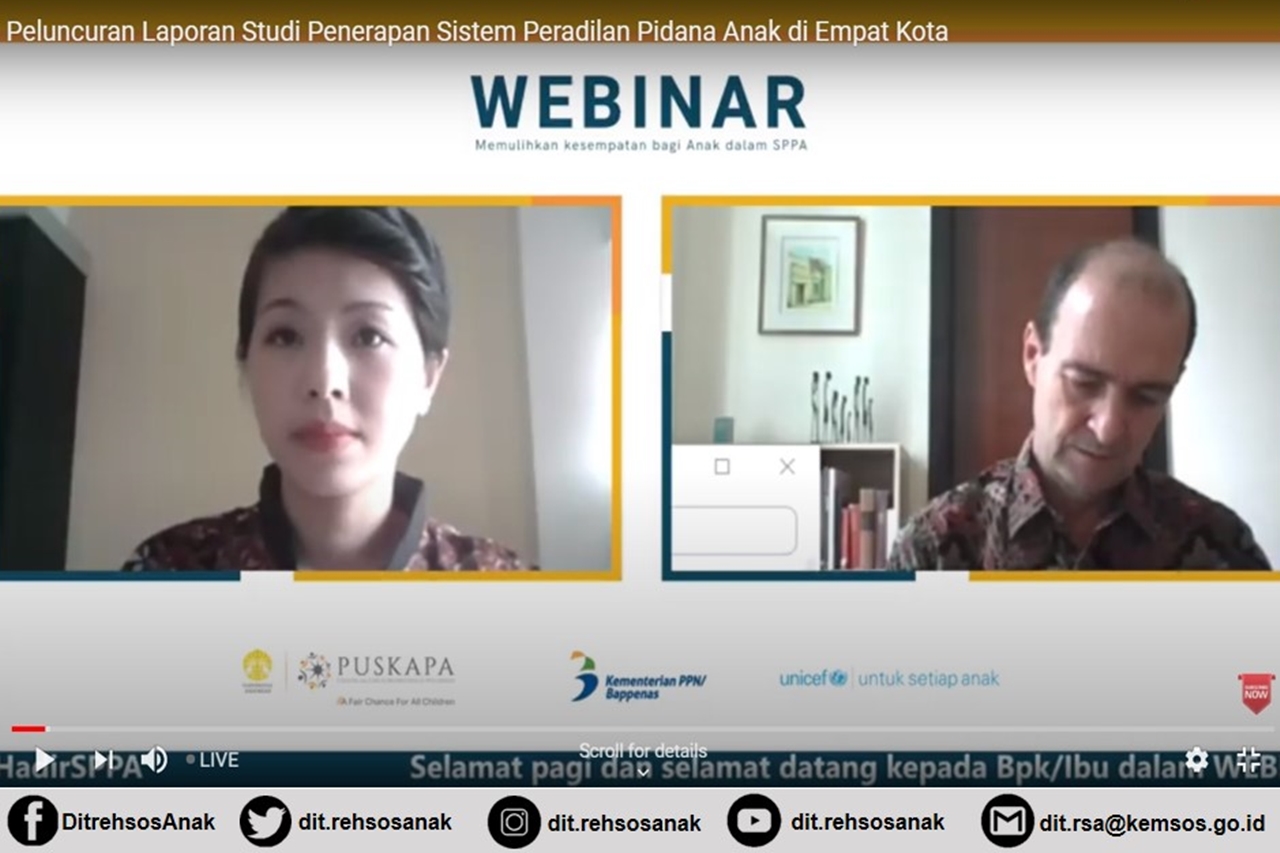Writer :
Humas Dit. Rehsos Anak
Editor :
Annisa YH
Translator :
Intan Qonita N
JAKARTA (November 4, 2020) - The Director of Child Social Rehabilitation of the Ministry of Social Affairs, Kanya Eka Santi was present as one of the responders at the Launching of the Results of the Study on the Implementation of the Juvenile Criminal Justice System in the City of Tangerang, Surabaya, Palembang and Kendari. The event was packaged in the form of a Webinar entitled “Second Chance in Life: Restoring Opportunities for Children in the Juvenile Criminal Justice System” which was held by the Ministry of National Development Planning/Bappenas and Center on Child Protection and Wellbeing at University of Indonesia (PUSKAPA) with the support of UNICEF Indonesia.
The webinar activity was opened by Slamet Soedarsono as Deputy for Political, Legal, Defense and Security Affairs of the Ministry of National Development Planning/Bappenas and Robert Gass, Deputy Representative of UNICEF Indonesia. The activity, which was also broadcast live on YouTube, involved the keynote speaker Prof. Harkristuti Harkrisnowo (Professor of the Faculty of Law, University of Indonesia), presentation of the results of the study by Santi Kusumaningrum (Director of PUSKAPA) and reviewer Agustinus Pohan (Lecturer of the Faculty of Law, Parahyangan Catholic University).
In his speech, Robert Gass said that Law Number 11 of 2012 concerning Child Criminal System (SPPA) is a fairly comprehensive legal rule in regulating the implementation of juvenile criminal justice in Indonesia. For this reason, good cooperation is needed in the implementation of these regulations.
UNICEF strongly supports the efforts of various parties in providing protection for children caught in legal cases. “We believe that every child has the opportunity to change and learn from their mistakes. Children can be anything they dream of, therefore there is nothing wrong if we give them a second chance,” said Robert.
On the other hand, Slamet Soedarsono said that the government is obliged to protect and fulfill children's rights as mandated by the 1945 Constitution. Conditions on the ground show several conditions that result in children's rights not being fully fulfilled. For example, children in conflict with the law (ABH) are vulnerable to the risk of violence and discrimination in carrying out the judicial process.
In this case, the challenge to ensure children's rights to health, education and social welfare of children when undergoing the judicial process becomes important to be carried out optimally by stakeholders. “The fulfillment of children's rights must be carried out in line with the principle of legal protection as regulated through the Convention on the Rights of the Child (CRC) which has been ratified through Presidential Decree No. 36/1990 on Ratification of CRC. For legal protection for ABH, the government issued Law Number 11 of 2012 concerning SPPA," said Soedarsono.
The webinar activity was opened by Slamet Soedarsono as Deputy for Political, Legal, Defense and Security Affairs of the Ministry of National Development Planning/Bappenas and Robert Gass, Deputy Representative of UNICEF Indonesia. The activity, which was also broadcast live on YouTube, involved the keynote speaker Prof. Harkristuti Harkrisnowo (Professor of the Faculty of Law, University of Indonesia), presentation of the results of the study by Santi Kusumaningrum (Director of PUSKAPA) and reviewer Agustinus Pohan (Lecturer of the Faculty of Law, Parahyangan Catholic University).
In his speech, Robert Gass said that Law Number 11 of 2012 concerning Child Criminal System (SPPA) is a fairly comprehensive legal rule in regulating the implementation of juvenile criminal justice in Indonesia. For this reason, good cooperation is needed in the implementation of these regulations.
UNICEF strongly supports the efforts of various parties in providing protection for children caught in legal cases. “We believe that every child has the opportunity to change and learn from their mistakes. Children can be anything they dream of, therefore there is nothing wrong if we give them a second chance,” said Robert.
On the other hand, Slamet Soedarsono said that the government is obliged to protect and fulfill children's rights as mandated by the 1945 Constitution. Conditions on the ground show several conditions that result in children's rights not being fully fulfilled. For example, children in conflict with the law (ABH) are vulnerable to the risk of violence and discrimination in carrying out the judicial process.
In this case, the challenge to ensure children's rights to health, education and social welfare of children when undergoing the judicial process becomes important to be carried out optimally by stakeholders. “The fulfillment of children's rights must be carried out in line with the principle of legal protection as regulated through the Convention on the Rights of the Child (CRC) which has been ratified through Presidential Decree No. 36/1990 on Ratification of CRC. For legal protection for ABH, the government issued Law Number 11 of 2012 concerning SPPA," said Soedarsono.
Opportunities and Challenges in the Implementation of the SPPA Law
Professor of the Faculty of Law, University of Indonesia, Prof. Harkristuti Harkrisnowo, as the keynote speaker explained that the efforts that have been made to accelerate the implementation of SPPA include the preparation of modules for Integrated Training carried out by all elements involved in the implementation of the SPPA Law, training for trainers organized by Human Resources Development Agency (BPSDM) of Ministry of Law and Human Rights, integrated training for Law Enforcement Officials (APH) and related parties in the implementation of SPPA at BPSDM Ministry of Law and Human Rights as well as the Education and Training Agency of the National Police, the Attorney General's Office and the Supreme Court, coordination and consultation between APH and related parties, and increasing partnerships with community organizations that care about ABH.
"We have a number of opportunities including increasing human resources in the field of ABH services such as increasing the number of Child Judges, Child Prosecutors, Community Facilitators, and Social Workers serving children in various regions, institutional improvement, community organizations that are increasingly aware of the importance of children's rights and working for children. in the community as well as increasing commitment from professional organizations such as Peradi in handling ABH," said Harkristuti.
Explaining the results of the study, Santi Kusumaningrum, Director of PUSKAPA invited all parties to use a cross-sectoral cooperation framework in discussing SPPA issues. “We see that the Government of Indonesia is very clear about its commitment to protecting children. It can be seen from the various narratives offered, one of which is about Superior HR. Talking about superior human resources also means talking about children who can grow these advantages, including ABH. We believe that the SPPA Law is one of the most tangible manifestations of the State's intention and commitment to allow second chances in the lives of children, especially ABH," said Santi.
The study shows that the SPPA Law has not significantly prevented children from the justice system. In general, there has been a decrease in the number of ABH in prison, but the majority of children are still placed in adult facilities. In addition, the results of the study show that the majority of judges' decisions for children whose proceedings are continued until court examinations are in prison and most of the children examined in court are still in school. This illustrates that the SPPA Law has not been implemented optimally by APH and other parties.
Professor of the Faculty of Law, University of Indonesia, Prof. Harkristuti Harkrisnowo, as the keynote speaker explained that the efforts that have been made to accelerate the implementation of SPPA include the preparation of modules for Integrated Training carried out by all elements involved in the implementation of the SPPA Law, training for trainers organized by Human Resources Development Agency (BPSDM) of Ministry of Law and Human Rights, integrated training for Law Enforcement Officials (APH) and related parties in the implementation of SPPA at BPSDM Ministry of Law and Human Rights as well as the Education and Training Agency of the National Police, the Attorney General's Office and the Supreme Court, coordination and consultation between APH and related parties, and increasing partnerships with community organizations that care about ABH.
"We have a number of opportunities including increasing human resources in the field of ABH services such as increasing the number of Child Judges, Child Prosecutors, Community Facilitators, and Social Workers serving children in various regions, institutional improvement, community organizations that are increasingly aware of the importance of children's rights and working for children. in the community as well as increasing commitment from professional organizations such as Peradi in handling ABH," said Harkristuti.
Explaining the results of the study, Santi Kusumaningrum, Director of PUSKAPA invited all parties to use a cross-sectoral cooperation framework in discussing SPPA issues. “We see that the Government of Indonesia is very clear about its commitment to protecting children. It can be seen from the various narratives offered, one of which is about Superior HR. Talking about superior human resources also means talking about children who can grow these advantages, including ABH. We believe that the SPPA Law is one of the most tangible manifestations of the State's intention and commitment to allow second chances in the lives of children, especially ABH," said Santi.
The study shows that the SPPA Law has not significantly prevented children from the justice system. In general, there has been a decrease in the number of ABH in prison, but the majority of children are still placed in adult facilities. In addition, the results of the study show that the majority of judges' decisions for children whose proceedings are continued until court examinations are in prison and most of the children examined in court are still in school. This illustrates that the SPPA Law has not been implemented optimally by APH and other parties.
Ministry of Social Affairs Efforts
Responding to the results of the study, the Director of Child Social Rehabilitation, Kanya Eka Santi said that what has been conveyed by PUSKAPA and the team really describes ABH as a very complex situation. In addition, exposure from Prof. Harkistuti regarding the SPPA's journey shows that for a long time we have been trying to protect ABH through the SPPA, but the challenges in the field are quite large.
“Speaking of social rehabilitation, is not only talking about how to rehabilitate children, but also their families and social environment. The Ministry of Social Affairs has made various efforts so that the SPPA's mandate can be carried out properly, including responding to various reports of ABH cases in the area, prevention through Social Worker Activities Goes To School and Goes To Community Social Worker as well as social rehabilitation services at Children's Centers/Workshops," said Kanya.
“In the field, we are still experiencing difficulties due to the lack of human resources in handling ABH. The number of Social Workers, in this case Sakti Peksos, is very limited where there is only 1 Peksos in 1 district/city. This is a challenge in handling ABH problems,” added Kanya.
Kanya also mentioned that ABH affairs are also the responsibility of the Regional Government. This is in accordance with the mandate of Law Number 23 of 2014 concerning Regional Government. In this regard, the fact is that not many regions have Social Workers to handle ABH. “We encourage districts/cities to carry out the SPPA's mandate by allocating funds to recruit human resources for ABH services and establishing Social Welfare Organizing Institutions (LPKS) in their regions.
Currently we have 764 Sakti Peksos throughout Indonesia and the number of ABHs that have been handled through case response until September is 5,990 children. Out of 5,990 children, currently 5,109 have returned to their families,” explained Kanya.
“When we consider the best interests of the child, both the perpetrator and the victim, both of them are entitled to assistance. Of course we need Social Workers to carry out intensive supervision in order to ensure that children can be rehabilitated properly," said Ciput, a representative of the Ministry of Women's Empowerment and Child Protection.
"We have responded to many cases, including severe cases. This requires not only the role of social workers but also the support of the community. The challenge is when there is rejection from the community against child perpetrators who commit serious cases. For that, we will always provide assistance in this regard,” added Kanya.
Responding to the results of the study, the Director of Child Social Rehabilitation, Kanya Eka Santi said that what has been conveyed by PUSKAPA and the team really describes ABH as a very complex situation. In addition, exposure from Prof. Harkistuti regarding the SPPA's journey shows that for a long time we have been trying to protect ABH through the SPPA, but the challenges in the field are quite large.
“Speaking of social rehabilitation, is not only talking about how to rehabilitate children, but also their families and social environment. The Ministry of Social Affairs has made various efforts so that the SPPA's mandate can be carried out properly, including responding to various reports of ABH cases in the area, prevention through Social Worker Activities Goes To School and Goes To Community Social Worker as well as social rehabilitation services at Children's Centers/Workshops," said Kanya.
“In the field, we are still experiencing difficulties due to the lack of human resources in handling ABH. The number of Social Workers, in this case Sakti Peksos, is very limited where there is only 1 Peksos in 1 district/city. This is a challenge in handling ABH problems,” added Kanya.
Kanya also mentioned that ABH affairs are also the responsibility of the Regional Government. This is in accordance with the mandate of Law Number 23 of 2014 concerning Regional Government. In this regard, the fact is that not many regions have Social Workers to handle ABH. “We encourage districts/cities to carry out the SPPA's mandate by allocating funds to recruit human resources for ABH services and establishing Social Welfare Organizing Institutions (LPKS) in their regions.
Currently we have 764 Sakti Peksos throughout Indonesia and the number of ABHs that have been handled through case response until September is 5,990 children. Out of 5,990 children, currently 5,109 have returned to their families,” explained Kanya.
“When we consider the best interests of the child, both the perpetrator and the victim, both of them are entitled to assistance. Of course we need Social Workers to carry out intensive supervision in order to ensure that children can be rehabilitated properly," said Ciput, a representative of the Ministry of Women's Empowerment and Child Protection.
"We have responded to many cases, including severe cases. This requires not only the role of social workers but also the support of the community. The challenge is when there is rejection from the community against child perpetrators who commit serious cases. For that, we will always provide assistance in this regard,” added Kanya.
In response to the closing, Agustinus Pohan questioned about the meaning of restorative. According to the lecturer in Law at Parahyangan University, SPPA has not fully protected children. Therefore, Pohan asked the question "Do we need to improve the law which takes a long time or in practice?".
At the end of the event, the webinar was closed with remarks from Prahesti Pandanwangi as the Director of Law and Regulation of the Ministry of National Development Planning/Bappenas encouraging the agreement of the various parties present to optimally implement the SPPA Law.
At the end of the event, the webinar was closed with remarks from Prahesti Pandanwangi as the Director of Law and Regulation of the Ministry of National Development Planning/Bappenas encouraging the agreement of the various parties present to optimally implement the SPPA Law.
Share :
 English
English
 Bahasa
Bahasa



